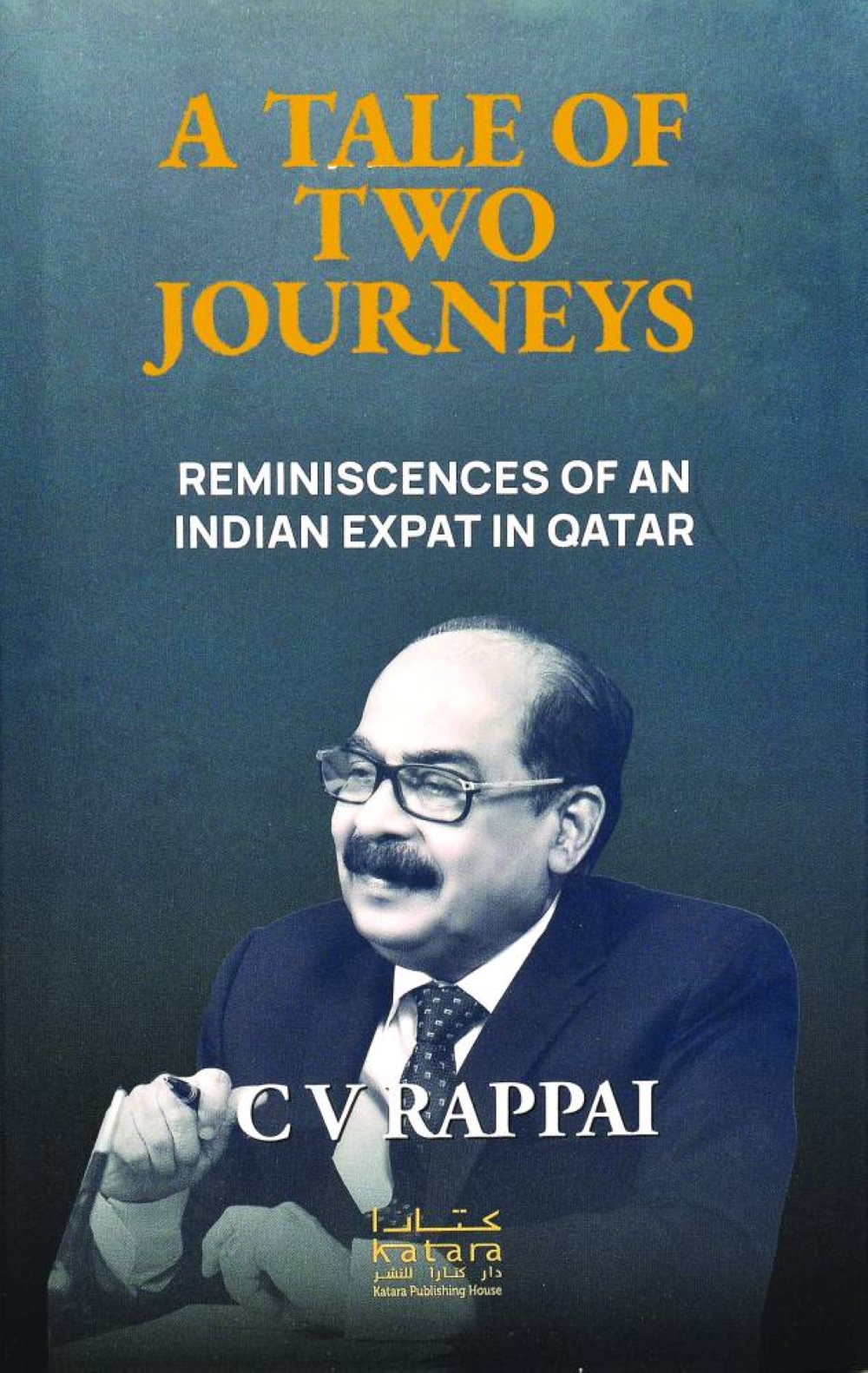Now, Rappai has penned his memoir ‘A Tale of Two Journeys’, edited by Hussain Ahmad and published by Katara Publishing House. Told in two parts, the book chronicles his journey from a struggling expatriate to a successful entrepreneur in Doha and his early life in his hometown of Edathuruthy in Thrissur district of Kerala. Having spent more than four decades in Qatar, Rappai’s rise as a businessperson has been phenomenal, but what is little known is the exceptional hard work, determination and fortitude that has made him an inspirational success story among fellow expatriates. In this book, Rappai has put into words the circumstances and opportunities that came his way as also the odds and challenges he faced in the company’s growth story.
Hailing from a middle-class family, Rappai had come empty-handed to Qatar in the November of 1980, “carrying just a duffel bag which contained some clothes, banana chips and some sweets for my friends” with a mountain of debt back home. He was in “dire straits” after the sudden death of his father, having faced with the responsibilities of looking after his large family at a young age and also being responsible to repay the debts incurred by his father to run the family business.‘A Tale of Two Journeys’
Author: C V Rappai
Edited by: Hussain Ahmad
Katara Publishing House
Genre: Memoir
Armed with a commerce degree and some work experience from various stints back home, Rappai had looked to rebuild his life in the Gulf like thousands of people from his home state of Kerala. However, the questions lingered as he stepped off the plane in Doha: “What does this land have to offer me?; What are the local people like? What job will I get? ...” Well, he didn’t have to wait long for the answers. His first job was that of an accountant at a small shop called Video Home and Electronics Centre in the erstwhile shopping district of Musheireb.
Rappai was initially taken aback as his ‘office’ was a hole-in-the wall establishment renting out video cassettes. But little did he know that he was being part of a grand expansion plan. He also met his mentors there – Jassim Mohammed Suleiman, Ali Mohammed and Nadir – partners of Video Home, who were set to change the course of his life and destiny in the time to come.
Video Home did roaring business in the ‘80s and graduated to become Jumbo Electronics, a dealer of leading Japanese and Korean brands of the time. Most notable among them was Goldstar, now known as LG. Rappai, entrusted with the operations of the company, steered Jumbo’s success to greater heights, and in the process was recognized and rewarded for his contribution to the organisation. The rest is history.
Rappai fondly remembers Qatar’s changing landscape that he has been witness to from the early days. He vividly paints the Old Doha of the ’80s and ’90s, and its eventual transformation to a city of iconic landmarks and high-rises. Looking back, he also chronicles the dark days of Gulf War in the ’90s, marked by fear and uncertainty for the locals and expatriates and his personal experience in dealing with the situation, and the Covid-19 crisis – all of them leaving a deep impact on the citizens and residents of this tiny nation. But Qatar was resilient in all of this and emerged stronger each time, kudos to its wise leadership, which remained calm, patient and composed and worked its way out of the situation. “Qatar’s crisis management offers valuable lessons for other countries, and even individuals -- for people like you and me,” he writes.
Rappai’s success in the business world has led him to other community and social roles. He is a director on the board of Inkel Ltd, a public-private partnership venture of Kerala government for infrastructure development. He serves on the board of Norka-Roots, again a Kerala government initiative for the welfare of expatriates, and he is also associated with Loka Kerala Sabha where he served as chairman of a committee formed to study ‘Quality and Prospects of Migration’. Rappai takes immense pride in his association with these organisations where, together with other community leaders, he has been able to contribute to the welfare of expatriates working in Qatar.
The book is a delightful read. Written in first-person, Rappai has kept the narrative simple and free-flowing, as he traverses deep down the memory lane to present past events and anecdotes with clarity and candour. The first part of the book is particularly interesting where a much younger Rappai dabbles in multiple roles as a journalist, politician, social worker, stage artist and a government employee. The episode of politician MA John is thought-provoking as it comes to haunt him in Doha as well.
Rappai has paid glowing tributes to his family members, friends, acquaintances and mentors who have influenced him and shaped his journey. The poignant story of his dear friend P K Abdul Rahim, as also his relationship with Sreedharan Master stand out as examples of true friendship and self-less love.
Rappai also shares his management principles, life lessons, business insights and observations, and his take on community development and service that have come to characterize his journey as a successful entrepreneur and a better human being. In telling his story, Rappai has also narrated the exciting journey of Qatar from a small peninsula in the Gulf to a nation that hosted one of the best FIFA World Cups ever.

